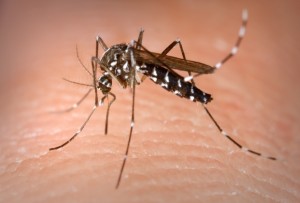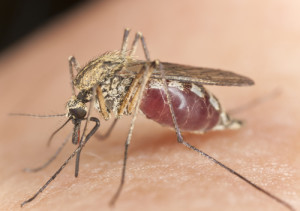Insects are survivors. You may have heard a commonly stated line about the hardiness of cockroaches and that “they will survive a nuclear attack after everything else is gone”. It’s true that nature has provided all insects with adaptations that allow them to not only survive but also thrive. In the case of mosquitoes, their ability to reproduce ensures they will be here for a long time to come.
Depending on the species mosquitoes can reproduce 4 times during a year, laying as many as 300 eggs each time. During warm weather, it will take 7 to 10 days for those eggs to hatch and produce adult mosquitoes. With half of those mosquitoes (the females) laying another 300 eggs each cycle, you can see it takes little time for us to notice these tiny insects in a big way.
Mosquitoes live in shade, darkness, cooler temperatures and moisture all are an ideal mosquito habitat. The Asian Tiger Mosquito is an aggressive biter and one we can encounter during the summer. You may be surprised to know they are anywhere from 2-10 mm in size. That means they can be about the size of a kidney bean. So let’s talk about one place in your garden you wouldn’t think they could hide – your mulch. Does your mulch provide shade, darkness, cooler temperatures and moisture? Sure it does. All these elements make for ideal mosquito habitat. Mosquitoes tend to hide in shrubs, mulch and under decks during the heat of the day or to escape wind.
If you do use mulch in your garden, know that large and irregular pieces of mulch provide the best hiding places for mosquitoes. Nugget or chunk size mulch looks nice when tossed into a garden but leaves a lot of nooks and crannies where a mosquito can hide during the day. Mosquitoes don’t travel far because they are not strong fliers, many flying no more than two miles from where they are born. Being close to their blood meal is important. Your mulched garden can be an ideal spot where they hide during the day and fly out as you walk by in the late afternoon.
A thick mulch bed retains more moisture in the soil than a thin one. Consider mulching no more than 3” deep to prevent the mulch from absorbing too much moisture. Using shredded mulch will provide fewer open pockets and places in the mulch for mosquitoes to hide. Shredded mulches will settle over time and provide fewer open hiding places for mosquitoes.
Fact or fiction: Will mulch keep mosquitoes away?
There is an argument, which says that the cedar fragrance produced by mulch will keep mosquitoes away. Just like other forms of “natural mosquito repellents” such as lemongrass and citronella, it would take a whole lot of fragrance, produced for a very long time, to properly repel mosquitoes. Mulch loses its scent over time, and thus any ability to repel mosquitoes. If you think that adding huge, overfilled mulch beds will keep the mosquitoes away, think again. As I explained above, mulch actually creates an idea mosquito habitat, even if at first if offers a degree of repellent value.



